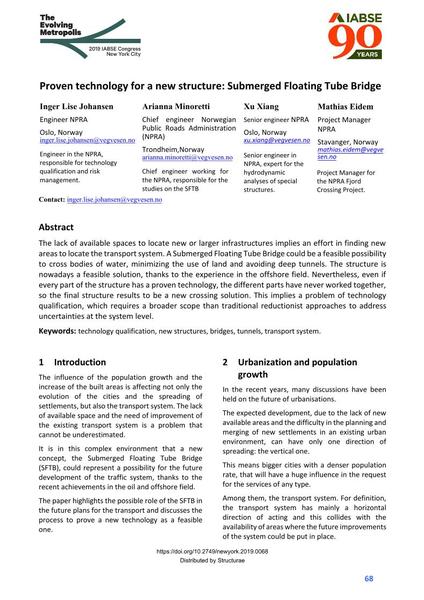Proven technology for a new structure: Submerged Floating Tube Bridge

|
|
|||||||||||
Détails bibliographiques
| Auteur(s): |
Inger Lise Johansen
(Statens Vegvesen, Norwegian
Public Roads Administration
(NPRA))
Arianna Minoretti (Statens Vegvesen, Norwegian Public Roads Administration (NPRA)) Xiang Xu (Statens Vegvesen, Norwegian Public Roads Administration (NPRA)) Mathias Eidem (Statens Vegvesen, Norwegian Public Roads Administration (NPRA)) |
||||
|---|---|---|---|---|---|
| Médium: | papier de conférence | ||||
| Langue(s): | anglais | ||||
| Conférence: | IABSE Congress: The Evolving Metropolis, New York, NY, USA, 4-6 September 2019 | ||||
| Publié dans: | The Evolving Metropolis | ||||
|
|||||
| Page(s): | 68-73 | ||||
| Nombre total de pages (du PDF): | 6 | ||||
| DOI: | 10.2749/newyork.2019.0068 | ||||
| Abstrait: |
The lack of available spaces to locate new or larger infrastructures implies an effort in finding new areas to locate the transport system. A Submerged Floating Tube Bridge could be a feasible possibility to cross bodies of water, minimizing the use of land and avoiding deep tunnels. The structure is nowadays a feasible solution, thanks to the experience in the offshore field. Nevertheless, even if every part of the structure has a proven technology, the different parts have never worked together, so the final structure results to be a new crossing solution. This implies a problem of technology qualification, which requires a broader scope than traditional reductionist approaches to address uncertainties at the system level. |
||||
| Mots-clé: |
ponts tunnel
|
||||

